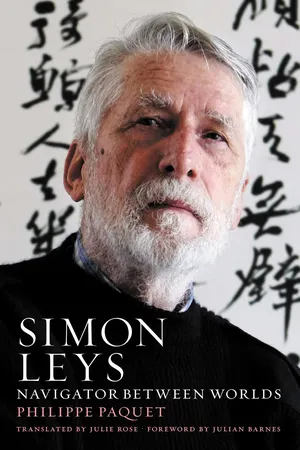
- 720 pages
- English
- ePUB (mobile friendly)
- Available on iOS & Android
About this book
An award-winning biography of one of the greats. Simon Leys is the pen-name of Pierre Ryckmans, who was born in Belgium and settled in Australia in 1970. He taught Chinese literature at the Australian National University and was Professor of Chinese Studies at the University of Sydney from 1987 to 1993. He died in 2014.Writing in three languages – French, Chinese and English – he played an important political role in revealing the true nature of the Cultural Revolution. His writing on China and on varied literary and cultural topics appeared regularly in the New York Review of Books, Le Monde, Le Figaro Littéraire, Quadrant and the Monthly, and his books include The Hall of Uselessness, The Death of Napoleon, Other People's Thoughts and The Wreck of the Batavia & Prosper. In 1996 he delivered the ABC's Boyer Lectures. His many awards include the Prix Renaudot, the Prix Mondial Cino Del Duca, the Prix Guizot and the Christina Stead Prize for fiction.This substantial biography – recently published by Gallimard in France to wide acclaim and winning an award from the Académie Francaise – draws on extensive correspondence with Ryckmans, as well as his unpublished writings. It has been translated by an internationally renowned French translator Julie Rose (based in Sydney).Philippe Paquet is a Belgian journalist and sinologist. He was president of the Society of Editors of La Libre Belgique from 1997 to 2007. He is a lecturer at the Free University of Brussels and at the Higher Institute of Translators and Interpreters. For La Libre Belgique he covers China and the United States. His previous biography, Madame Chiang Kai-shek: A Century of Chinese History, won numerous literary prizes.
Tools to learn more effectively

Saving Books

Keyword Search

Annotating Text

Listen to it instead
Information
Table of contents
- Cover Page
- Title Page
- Copyright
- Dedication
- Contents
- Foreword: Julian Barnes
- Prologue: Under the Sign of Confucius
- I The Law, Art and Faith
- II The Other Pole of Human Experience
- III Communism in Action
- IV The Inner China
- V The Sea and The Motherland
- Epilogue: The Pursuit of Truth
- Acknowledgements
- Chronology
- Endnotes
- Bibliography of Simon Leys
- Index
- Back Cover
Frequently asked questions
- Essential is ideal for learners and professionals who enjoy exploring a wide range of subjects. Access the Essential Library with 800,000+ trusted titles and best-sellers across business, personal growth, and the humanities. Includes unlimited reading time and Standard Read Aloud voice.
- Complete: Perfect for advanced learners and researchers needing full, unrestricted access. Unlock 1.4M+ books across hundreds of subjects, including academic and specialized titles. The Complete Plan also includes advanced features like Premium Read Aloud and Research Assistant.
Please note we cannot support devices running on iOS 13 and Android 7 or earlier. Learn more about using the app